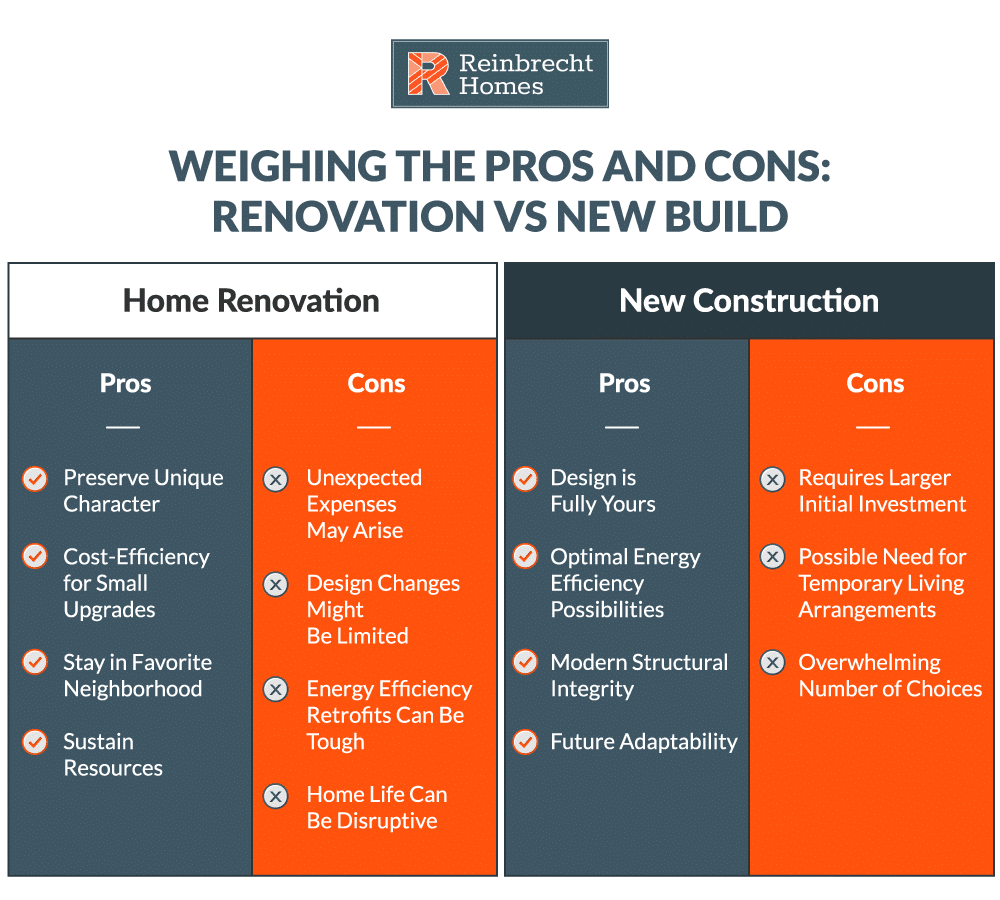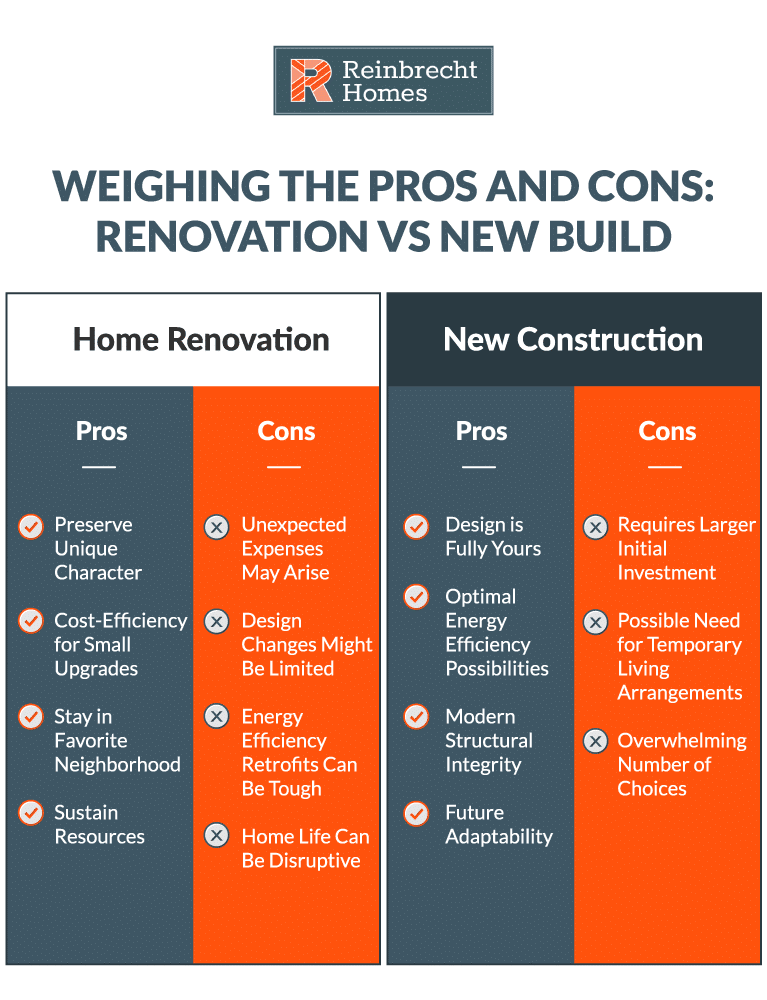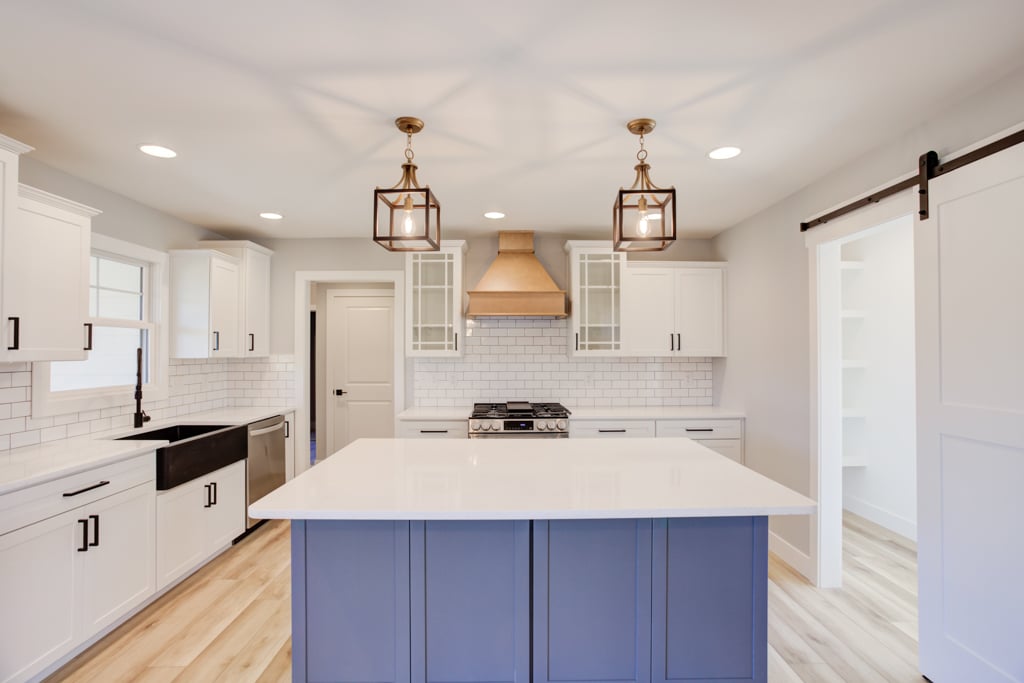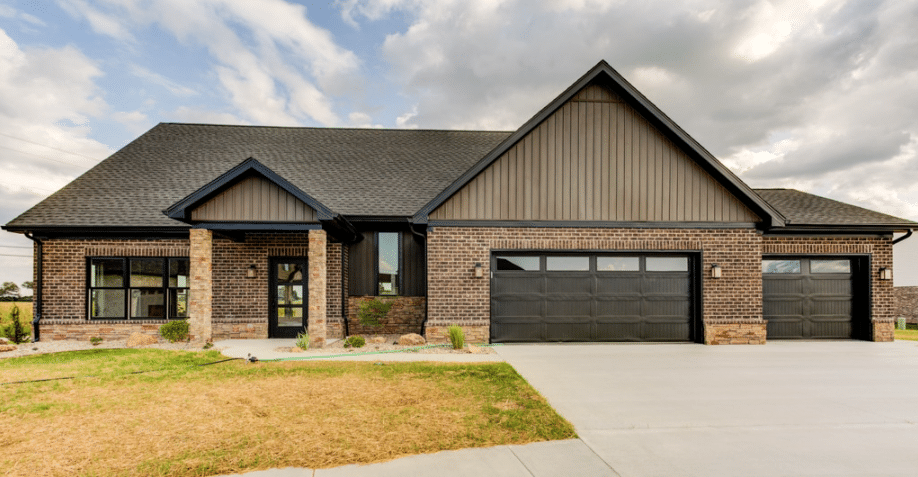Deciding how to improve your living space is a significant financial and emotional decision. For many homeowners, the question arises: Should you invest in renovating your current home, or is it better to start fresh with new construction? Both options offer unique benefits and challenges, depending on factors such as budget, energy efficiency goals, timelines, and personalization desires.
This dilemma is common among families and individuals in Southern Indiana and Eastern Illinois seeking a home that better fits their lifestyle or future plans. Whether you have a sentimental attachment to your current space or envision a tailor-made, modern living experience, understanding the pros and cons of each approach is essential for making an informed decision.
Key Factors in Deciding: Home Renovation vs New Construction
When determining whether to renovate your existing home or build a new one, it’s essential to weigh the factors that contribute most to your needs, budget, and future goals. Here are the key elements to keep in mind:
Budget and Financial Considerations
Renovations might seem more cost-effective initially, especially for minor updates. However, unexpected expenses often arise, such as structural issues or necessary upgrades. New construction generally has higher upfront costs but offers more predictable pricing and reduces the likelihood of surprise expenses. Additionally, new builds often feature modern materials and energy-efficient solutions, potentially lowering maintenance and utility costs over time.
Timelines and Lifestyle Disruptions
Renovations can be highly disruptive, with contractors, noise, and dust affecting daily life. Living in a home under renovation often necessitates adjustments to routines. In contrast, new construction follows a more structured schedule, though it also requires patience and may involve temporary housing during the build. Once completed, the transition is simpler, allowing you to move into a finished, ready-to-live-in space without ongoing disruptions.
Customization & Design Possibilities
Renovations allow updates to specific areas while preserving certain features, but they may come with limitations based on the existing structure. New construction offers extensive design flexibility, allowing homeowners to tailor many aspects of their home—from the floor plan to detailed finishes—to align with their current needs and future aspirations.
Energy Efficiency Upgrades
Energy efficiency is crucial for reducing environmental impact and lowering utility bills. Renovations can include updates like adding insulation or replacing windows, but may be limited by the original structure. Building new allows for the integration of cutting-edge smart home technology from the ground up, resulting in modern HVAC systems and convenient automation features.
Long-Term Goals and Adaptability
Whether you’re planning for a growing family, aging in place, or resale considerations, your decision should accommodate your long-term vision. Renovations can extend your home’s functionality, but new construction allows you to design a home that grows with you, adding extra bedrooms or dedicated office spaces as needed.
Exploring the Pros and Cons of Home Renovation vs. New Home Construction
Renovating your existing home can be rewarding and practical, but it comes with challenges. Here’s a balanced look at the advantages and drawbacks:


Advantages of Home Renovation
- Preserve Sentimental or Historic Features: Renovations can modernize your home while maintaining its unique character or sentimental appeal.
- Lower Initial Costs for Minor Updates: Targeted updates like remodeling a kitchen or updating fixtures typically cost less upfront compared to building new.
- Remain in a Beloved Location: Enhancing your current home lets you stay in a neighborhood you appreciate without the hassle of moving.
- Sustainability and Resource Savings: Reusing existing structures and materials reduces waste and the environmental impact associated with demolition.
Disadvantages of Home Renovation
- Risk of Hidden and Mounting Costs: Unexpected issues, such as outdated wiring or water damage, can significantly increase renovation expenses.
- Limited Design Flexibility: Existing structural elements may restrict how much you can change, making extensive design alterations complex.
- Challenges in Improving Energy Efficiency: Retrofitting advanced systems is often more difficult and less effective than integrating them during new construction.
- Disruptions to Daily Life: Continuous noise, dust, and contractor activity can disrupt your routine for an extended period.
Benefits of Building New
- Extensive Design Flexibility: From floor plans to finishes, you have control over countless details, ensuring your home meets your exact specifications.
- Enhanced Energy Efficiency: Incorporate the latest energy-efficient materials and systems, lowering utility bills and environmental impact.
- Built for Structural Integrity and Longevity: New builds meet modern standards, offering structural integrity and minimal maintenance needs.
- Future-Proof Features: Design your home to accommodate future lifestyle changes, from extra bedrooms to multipurpose spaces.
Drawbacks of New Construction
- Higher Initial Costs: Building new typically requires a larger upfront investment, including land acquisition and materials.
- Temporary Housing Needs: You may need to arrange separate housing during construction, which can add complexities.
- Decision-Making Overload: Choosing every detail, from countertop materials to paint colors, can feel overwhelming without expert guidance.
Comparing the Costs: Renovation vs New Construction
Financial considerations play a crucial role in deciding between renovating and building new:
Initial Expenses and Predictability
Renovations may require lower initial outlays for minor projects but can incur unplanned costs down the line. New builds involve higher upfront expenses yet often provide more accurate cost estimates.
Hidden Costs and Contingencies
Renovations may reveal hidden problems that increase costs, while new construction generally reduces surprises when working with an experienced builder.
Long-Term Maintenance Costs
Modern construction materials and systems tend to demand less upkeep than older homes, potentially saving money over the years.
Resale Value and Investment Return
Modern, custom-built homes often deliver higher resale value and greater appeal to buyers seeking updated features.
Customization: Comparing the Possibilities in New Construction and Renovation

Personalizing your home is a significant benefit of both renovation and new construction. However, the extent of customization hinges on your approach:
Limitations of Customization in Renovation
Renovations must work with existing structures, which can limit layout changes or modern additions, especially for major overhauls.
The Extensive Potential of New Construction
Building new offers the freedom to incorporate modern materials and designs that suit your vision, though this can be influenced by budget, local regulations, and site characteristics.
Semi-Custom Homes
Semi-custom homes strike a balance between full custom builds and minor renovations. Reinbrecht Homes specializes in semi-custom options, featuring time-tested floor plans that can be tailored to meet your unique preferences.
Energy Efficiency and Environmental Impact
Energy efficiency is central to both reducing bills and minimizing environmental impact:
Challenges of Upgrading Older Homes
Renovations can improve your home’s efficiency but may face constraints from established layouts and materials.
Energy Efficiency Advantages of New Construction
New builds integrate eco-friendly designs from the outset, offering significant long-term savings on utilities and potentially reducing a home’s carbon footprint.
Environmental Considerations of Both Options
Renovations can reduce waste by repurposing existing materials. New construction can incorporate the latest, most eco-friendly building practices, including smart home technology.
Timelines and Lifestyle Disruptions
How your daily life might be affected is another critical factor:
Renovation: Ongoing Adjustments
Renovation schedules can stretch longer than expected, causing noise and dust that disrupt day-to-day routines.
New Construction: A Clearer Path, but Longer Wait
New builds follow a more predictable timeline; however, it might take additional months before you can move in. Working with experienced builders streamlines the process.
Minimizing Disruptions with Project Management
Open communication and effective planning help reduce headaches whether you’re updating an existing home or building new. Reinbrecht Homes uses project management platforms to keep clients informed throughout the construction process.
When Is Renovation the Right Choice?
Consider renovating if:
- You’re Focused on Minor Updates – Projects like remodeling a kitchen or refreshing a bathroom can enhance both function and style.
- You Want to Stay in Your Current Neighborhood – Avoid relocating by upgrading the home you already love.
- You Value Sentimental Features – Preserving architectural charm or family memories is important to you.
- Local Regulations Limit Expansion – In areas with strict rules, renovation might be more straightforward.
When is Building New the Better Decision?
Building a home from the ground up may be best if:
- You Desire a Modern, Tailored Design – Start fresh to tailor every aspect to your lifestyle.
- Energy Efficiency Is a Top Priority – Integrate advanced, eco-friendly systems during construction for maximum savings.
- You Need Extensive Structural Changes – Reconfiguring an older home can be more expensive and complex than starting new.
- You’re Planning for Future Flexibility – Design your home with potential expansions or changing needs in mind.
- You Want Higher Resale Potential – Contemporary homes with state-of-the-art features often command greater market interest.
Why Reinbrecht Homes is Your Partner for New Construction
Reinbrecht Homes has over 25 years of experience in the homebuilding industry, focusing on custom and semi-custom homes individualized to each client’s requirements. From personalized floor plans to energy-efficient features, their approach emphasizes quality construction and attention to detail. Their Home Buyers Warranty further underscores their commitment to customer satisfaction and peace of mind.
At Reinbrecht Homes, transparency is a top priority. Clients benefit from a construction loan process that can consolidate fees, simplifying budgeting. With a dedicated team ready to guide you through each phase, from selecting a location to final inspections, you’ll find that their commitment to communication sets them apart. Whether you want a contemporary layout tailored to your family’s evolving needs or you seek a timeless design that captures the best of classic architecture, Reinbrecht provides the options and flexibility necessary to bring your vision to life. By integrating energy-efficient materials and modern technology, Reinbrecht Homes helps homeowners reduce future utility expenses and environmental impacts, ensuring the longevity of your investment.

Making the Best Decision for Your Future Home
Deciding between home renovation and new construction is a defining step in shaping your future living space. Renovations let you retain the essence of your current home, making targeted improvements to enhance comfort and style. They’re ideal if you value existing charm, have smaller-scale updates in mind, or want to avoid changing locations.
Meanwhile, new construction offers a chance to create a space perfectly aligned with your life goals, maximizing design flexibility, energy efficiency, and modern convenience. While it generally involves a larger initial investment, the long-term rewards—ranging from lower maintenance costs to higher resale potential—can be substantial.
By carefully evaluating each option’s advantages and drawbacks, you can determine which path delivers the best balance of financial value and quality of life.
Take the Next Step Toward Your Dream Home
Ready to transform your vision into reality? Reinbrecht Homes is here to guide you—whether you’re exploring new construction or weighing the benefits of renovation. With decades of expertise, energy-efficient designs, and flexible floor plan options, our team makes the journey to your perfect home straightforward and rewarding.
Schedule a consultation with Reinbrecht Homes today to discuss your ideas, view our variety of floor plans, and learn how our personalized approach can bring your dream home to life.




